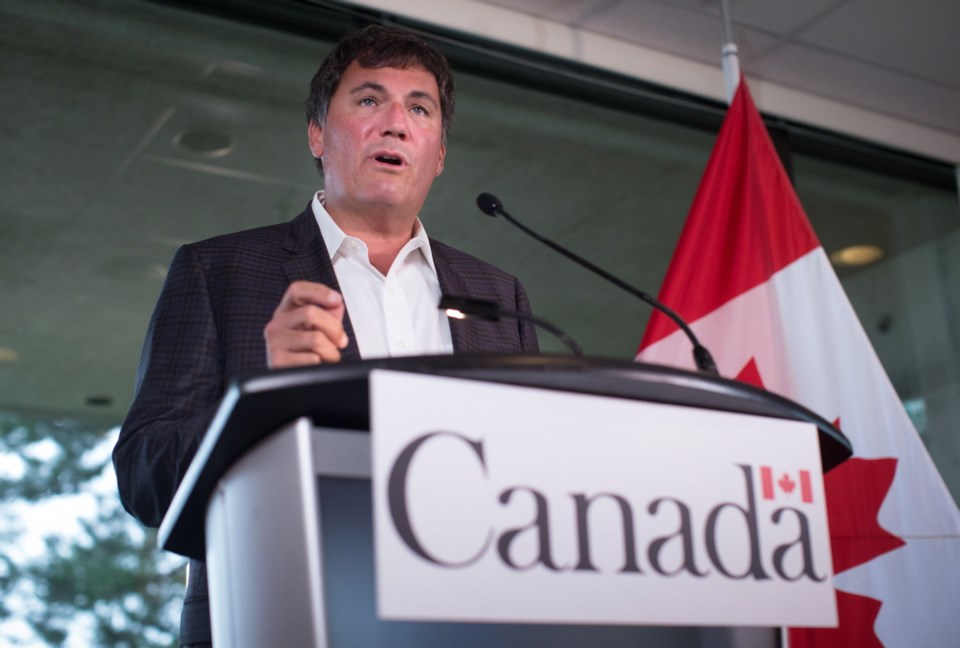The Department of Fisheries and Oceans has renewed its commitment to protect wild salmon, but it won’t ban open-net pen fish farms, which some say threaten wild salmon health, or remove aquaculture promotion from its mandate.
Federal Fisheries Minister Dominic LeBlanc said restoring Fraser River sockeye salmon runs is a top priority and called the delay in action “unacceptable.”
LeBlanc announced the federal government’s commitment to implement a suite of recommendations which were made four years ago by the Cohen Commission.
The Harper government assigned B.C. Supreme Court Justice Bruce Cohen to lead an inquiry into the collapse of sockeye salmon stocks in the Fraser River in 2009, following three years of fisheries closures.
The Cohen Commission released its findings in 2012, based on 179 witness testimonies, thousands of exhibits and hundreds of public submissions.
Of the 75 recommendations, 32 have been implemented, LeBlanc said.
In addition, $197.1 million already announced in the federal budget will be used over five years to support 29 new Pacific scientists and technicians to research and monitor fish health and ecosystem stressors, and support sustainable aquaculture.
Mike Meneer, vice-president of the Pacific Salmon Foundation, a non-profit group dedicated to conserving and restoring wild Pacific salmon and their habitats, applauded the department’s commitment to research, especially as it relates to open-net pen fish farms.
“This is a question that science really needs to address,” he said. “There’s no doubt that the public wants and needs clarity.”
He also thanked the government for its transparency in reporting progress and said it was significant to hear, officially, that wild salmon is the department’s top priority.
Others were less impressed.
“In doing an analysis of the recommendations, it’s clear what the department has done is pick the low-hanging fruit,” said Greg Taylor, fisheries co-ordinator for Watershed Watch Salmon Society, which advocates for the conservation of B.C.’s wild salmon.
The heart of salmon protection lies in the DFO’s Wild Salmon Policy, he said, describing it as a constitution for how salmon should be managed that took a decade to put together. Cohen’s recommendations specific to the policy, including publishing an implementation plan by 2013, have not been completed. The department’s report calls for an update to the policy’s implementation plan through further consultation.
“This policy came into effect in 2005. It stagnated through the Harper years,” Taylor said. “We had real hopes that there would be significant progress with Prime Minister [Justin] Trudeau and the new government. But his failure to address the key recommendations by Cohen on the Wild Salmon Policy leave that in doubt.”
Fraser River salmon runs this year have been even worse than expected. The summer sockeye run was estimated Tuesday at 700,000, a drop from the already-low 992,000 estimate, according to the Pacific Salmon Commission, a Canadian-American agency that helps manage fisheries.
In 2009, just 1.4 million sockeye returned to B.C.’s waterways in the summer and late fall runs — well below the 10 million fish that were expected. The next year saw a record run of 30 million sockeye, but returns have been generally declining for at least a decade.
While salmon enhancement is about more than limiting aquaculture, Taylor said DFO’s mandate to promote salmon farming conflicts with its duty to conserve.
“I think the conflict inherent in managing [wild salmon] and promoting salmon farming is too great a bridge,” he said. “For the department to still be doing both, I think, needlessly undermines the credibility of the department.”
Chief Bob Chamberlin, chairman of the First Nations Wild Salmon Alliance, has called the federal department to move beyond the specific recommendations and commit to the spirit of the findings. Specifically, he said, it should limit open-net pen fish farming coastwide, not just in the Discovery Islands.
“The part I find disingenuous with freezing [licences] of the farms in Discovery Channel, is that just up the coast, five or ten miles from there, they’re expanding the industry and creating new farms,” Chamberlin said. “I’m glad they’re fulfilling that obligation, but if they’re not applying it coast-wide, it’s a waste of time.”
He said he looked forward to more meaningful consultation with First Nations, which LeBlanc promised for the fall.
Jeremy Dunn, executive director of the B.C. Salmon Farmers Association, hailed DFO’s commitment to sustainable aquaculture.
“We were pleased to hear that the minister is standing behind a sustainable aquaculture sector for Canada and believes it’s his job to promote business in Canada,” Dunn said.
The salmon farmers association has supported the Cohen Commission from the beginning, he said.
“The highlight [Tuesday] was really the government’s continued reaffirmation of support for science-based decision-making and significant funding for science with respect to all fisheries.”



